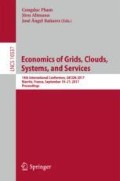Abstract
The inherently multi-stakeholder value chain of 5G services calls for business and service coordination. In this paper, we introduce and evaluate coordination models for the multi-provider service composition, namely the Fully Centralized, Distributed and per-Provider Centralized models, in the context of the 5GEx multi-provider orchestration framework. We perform a scalability assessment of the models in terms of the message overhead, also investigating the trade-off between service composition efficiency and message overhead. Our sensitivity analysis on the different parameters of our evaluation framework reveal that hybrid models scale better, but also other models may achieve the same level of message overhead under certain conditions.
References
The 5G Infrastructure PPP whitepapers. https://5g-ppp.eu/white-papers/
“NGMN 5G White Paper” by NGMN Alliance (2016). https://www.ngmn.org/uploads/media/NGMN_5G_White_Paper_V1_0.pdf
Sgambelluri, A., et al.: Orchestration of network services across multiple operators: The 5G exchange prototype. In: EuCNC (2017). http://www.5gex.eu/
Ersue, M.: ETSI NFV management and orchestration-An overview. In: Proceeding of the 88th IETF Meeting (2013)
Hayden, S., Carrick, C., Yang, Q.: Architectural design patterns for multiagent coordination. In: Proceeding of the International Conference on Agent Systems, vol. 99 (1999)
Zhang, Z., et al.: Decoupling QoS control from core routers: A novel bandwidth broker architecture for scalable support of guaranteed services. In: ACM SIGCOMM Computer Communication Review (2000)
Duan, Z., et al.: A core stateless bandwidth broker architecture for scalable support of guaranteed services. IEEE TPDS 15(2), 167–182 (2004)
Calheiros, R.N., et al.: A coordinator for scaling elastic applications across multiple clouds. Future Gener. Comput. Syst. 28(8), 1350–1362 (2012)
Lican, H., Wu, Z., Pan, Y.: Virtual and dynamic hierarchical architecture for E-science grid. Int. J. HPCA 17(3), 329–347 (2003)
Yu, H., Deborah, E., Ramesh, G.: A hierarchical proxy architecture for Internet-scale event services. In: Proceeding of IEEE 8th WET ICE (1999)
Acknowledgements.
This work has been performed in the framework of the H2020-ICT-2014 project 5GEx, which is partially funded by the European Commission. This information reflects the consortiums view, but neither the consortium nor the European Commission are liable for any use that may be done of the information contained therein.
Author information
Authors and Affiliations
Corresponding author
Editor information
Editors and Affiliations
Rights and permissions
Copyright information
© 2017 Springer International Publishing AG
About this paper
Cite this paper
Darzanos, G., Dramitinos, M., Stamoulis, G.D. (2017). Coordination Models for 5G Multi-provider Service Orchestration: Specification and Assessment. In: Pham, C., Altmann, J., Bañares, J. (eds) Economics of Grids, Clouds, Systems, and Services. GECON 2017. Lecture Notes in Computer Science(), vol 10537. Springer, Cham. https://doi.org/10.1007/978-3-319-68066-8_20
Download citation
DOI: https://doi.org/10.1007/978-3-319-68066-8_20
Published:
Publisher Name: Springer, Cham
Print ISBN: 978-3-319-68065-1
Online ISBN: 978-3-319-68066-8
eBook Packages: Computer ScienceComputer Science (R0)

